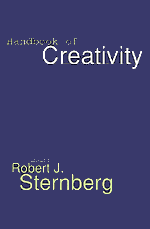Book contents
- Frontmatter
- Contents
- List of Contributors
- Preface
- Handbook of Creativity
- PART I INTRODUCTION
- PART II METHODS FOR STUDYING CREATIVITY
- PART III ORIGINS OF CREATIVITY
- PART IV CREATIVITY, THE SELF, AND THE ENVIRONMENT
- 10 Creative Cognition
- 11 From Case Studies to Robust Generalizations: An Approach to the Study of Creativity
- 12 Creativity and Knowledge: A Challenge to Theories
- 13 Creativity and Intelligence
- 14 The Influence of Personality on Artistic and Scientific Creativity
- 15 Motivation and Creativity
- 16 Implications of a Systems Perspective for the Study of Creativity
- PART V SPECIAL TOPICS IN CREATIVITY
- PART VI CONCLUSION
- Author Index
- Subject Index
10 - Creative Cognition
Published online by Cambridge University Press: 05 June 2014
- Frontmatter
- Contents
- List of Contributors
- Preface
- Handbook of Creativity
- PART I INTRODUCTION
- PART II METHODS FOR STUDYING CREATIVITY
- PART III ORIGINS OF CREATIVITY
- PART IV CREATIVITY, THE SELF, AND THE ENVIRONMENT
- 10 Creative Cognition
- 11 From Case Studies to Robust Generalizations: An Approach to the Study of Creativity
- 12 Creativity and Knowledge: A Challenge to Theories
- 13 Creativity and Intelligence
- 14 The Influence of Personality on Artistic and Scientific Creativity
- 15 Motivation and Creativity
- 16 Implications of a Systems Perspective for the Study of Creativity
- PART V SPECIAL TOPICS IN CREATIVITY
- PART VI CONCLUSION
- Author Index
- Subject Index
Summary
It will come as no surprise to readers of this volume that humans are an enormously creative species. In a relatively short span of time, geologically speaking, we have gone from fashioning rocks into our first primitive tools to building spacecraft that allow us to retrieve rocks from other planets. Many other species use implements, and some even modify found objects to improve their utility, but as far as we can determine, none other than humans have built upon those tool-making skills to reach beyond the grip of Earth's gravity. There really is something uniquely generative about human cognition.
A question that naturally arises in considering human accomplishment is the extent to which it springs from the singular efforts of a few individuals whose minds work in special and mysterious ways versus the more distributed efforts of the vast bulk of humanity whose minds all work in roughly the same, plainly generative ways. Is cumulative creative progress the province of a small set of geniuses or should the glory be spread more broadly?
We do not pretend to have the answer to this question in its grandest sense, but we do have the perspective that the capacity for creative thought is the rule rather than the exception in human cognitive functioning. We claim that (a) the hallmark of normative human cognition is its generative capacity to move beyond discrete stored experiences, (b) the processes that underlie this generativity are open to rigorous experimental investigation, and (c) creative accomplishments, from the most mundane to the most extraordinary, are based on those ordinary mental processes that, at least in principle, are observable.
- Type
- Chapter
- Information
- Handbook of Creativity , pp. 189 - 212Publisher: Cambridge University PressPrint publication year: 1998
- 46
- Cited by



